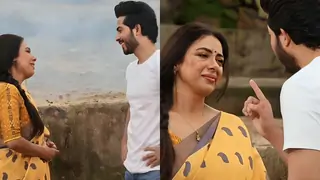'An artiste must be like a sponge'
| Guitarists Bruce Lee Mani and Prakash Sontakke say fusion is about one complete style, based on what sounds good and what doesn't |

THE SKY'S THE LIMIT The duo feels that music, in the broader sense, is about going beyond labels Photo: Murali Kumar K.
He has been the lead guitarist of the Bangalore band Thermal and a Quarter since its inception in 1996, and with it has evolved through a wide range of musical styles over the years. But Bruce Lee Mani's musical explorations has also extended to numerous other bands and forms of music, from jazz with the Rex Rosario Quartet to fusion with Arya, to metal with Lucid Dreams and a dozen other directions in between.
Prakash Sontakke has the unique distinction of being one of the few Indian musicians who plays the Hindustani slide guitar. An unassuming man who rarely falls into the stereotype of the classical musician, he is very respected in the field and recently completed his 1,250th concert. Besides Hindustani concerts, he has also collaborated on numerous film and ad film scores, besides unique projects such as Thermal and a Quarter's album Jupiter Cafe.
As the two guitarists play off each other's thoughts and tangents, RAKESH MEHAR tries furiously to keep pace.
Bruce: So do you see yourself as a niche musician or do you play mainstream Hindustani classical?
Prakash: I play mainstream Hindustani, but also I like to interact with other styles of music. I personally feel that Hindustani has all styles of music in it, even rock.
Bruce: Hindustani has rock? But rock doesn't have Hindustani?
Prakash: It does. It does sometimes.
Bruce: I guess it's not just knowledge and sound. Flavour is something that works in some contexts but not in others. But the key is to make it work. It's like having to carve an elephant out of a piece of rock where the only instruction is to hack away everything that's not elephant. So this idea of fusion music being just one style of music with some elements of another style, I don't like. If you understand each other and get into the groove of things, then you have something that's more than fusion, experimenting beyond the label of fusion. I personally dislike labels.
Prakash: Perhaps getting closer to your idea of going beyond labels, that's how people describe, in a broader sense, world music. It is music that is genuinely for everybody, not a particular class.
Bruce: Not for the rock club or the classical club... I guess world music is a good label, but that also, thanks to the record companies, doesn't apply. When you say world music you associate it with a certain set of artistes, which is not true.
Prakash: Fusion music would have made sense 40 years ago when one musician never heard any other style of music. When a Hindustani musician never heard rock and a rock musician never heard Hindustani.
Today when we've all heard so much of everybody, there is no way that you can say that you are not affected by it. So now it's only about one complete music style, which is based on how music itself is defined, what sounds good and what doesn't.
Bruce: Yes, that makes sense. An artiste has to be like a sponge. You have to keep absorbing everything. If at any point you stop absorbing, you're not really an artiste, you're a technician. Growth is inevitable if you let it happen.
Prakash: But nowadays, in the last five years, a jump has been happening ever since the music industry got influenced by the sample market attitude, wherein any sample is available in anywhere in the world. So you just go buy it and put some nice chords to some Nusrat Fateh Ali Khan or some bass to Asha Bhonsle.
Bruce: Make it more palatable to a particular market...
Prakash: Correct. That did not happen the way something like Shakti happened. That was really the confluence of two separate music styles coming together and really trying to understand each other. A sample always remains a sample. You could use it anywhere anyhow.
Today there are spectacular commercial successes like Enigma, which are just based on samples. But that doesn't become music. I think fusion music happened in India way back in the '60s when R.D. Burman came into the scene.
Bruce: He had a lot more Western influence in terms of his chord work and harmonies. And I don't think it was not done before, but he made that whole style of composition popular.
Prakash: I think his songs are the best example of fusion music, where there is a simple tabla roll in the first half and the second half has heavy drumming and then back into the tabla.
Bruce: And, it doesn't sound out of place.
Prakash: Yes. It's all part of one song.
Bruce: I was teaching some of my students some of his songs... And it's really nice to hear some very regular Western chords played behind a very Indian melody.
Prakash: Then, of course, Illaiyaraja.
Bruce: He was also classically trained.
Prakash: Surprisingly, even he is supposed to have been very influenced by Burman. In a recent interview he was talking about how R.D. Burman inspired him.
Bruce: Yeah. R.D. Burman is generally the inspiration for everyone.
Prakash: Probably this is one facet of R.D. Burman that Indian people don't realise.
Bruce: That he invented the sound that we had then. I don't think he gets talked about as the pioneer of fusion music. He's always been a Bollywood music director. Even before Bollywood became Bollywood. Was Bollywood Bollywood then?
(Laughs all around)
Bruce: Now, I don't know. All Bollywood music is essentially Western. In terms of sound, in terms of beat...
I don't know to what degree it is Western. But the sounds are very Western, and the lyrics and the emotion or the melodrama is very Indian. There are passages that are classical, maybe neo-classical or light classical, but a lot of the popular music is very Western.
Prakash: But this is not just happening with Bollywood. If you look at China, Japan or maybe all developing countries; they all have this new approach. Where all the film music sounds the same.
Bruce: It's a formula.
Prakash: I think the basic root is, anything that has got a rhythm has got a pulse.
Bruce: It's like that whole mass culture thing. If it's got a good beat, you can dance to it. All popular music is governed by that. If you can dance to it, it's fine.
Prakash: And even the so-called fusion of concepts is based on beats. There are very few cases where the fusion is based on melodic structures.
Bruce: Perhaps because that takes the listener more time and more understanding.
Prakash: And the same with the musician also.
Bruce: Musicians also say they have no time.
http://www.hindu.com/thehindu/mp/2006/05/20/stories/20060520 00910400.htm




















